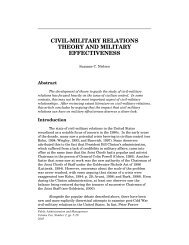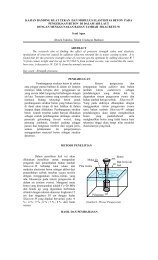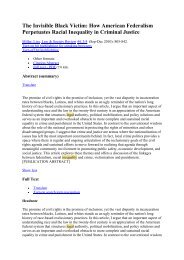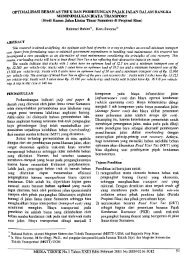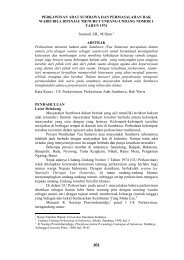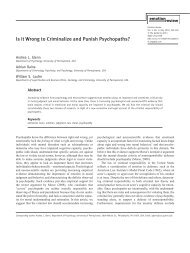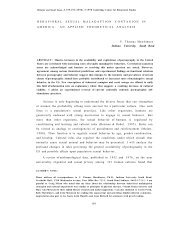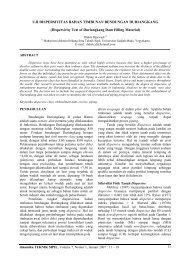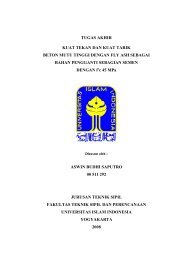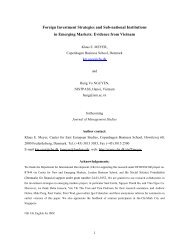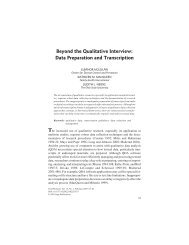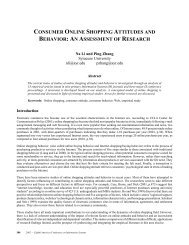Ski – resort and regional development: profile of visitors ... - E-Journal
Ski – resort and regional development: profile of visitors ... - E-Journal
Ski – resort and regional development: profile of visitors ... - E-Journal
Create successful ePaper yourself
Turn your PDF publications into a flip-book with our unique Google optimized e-Paper software.
10<br />
Carmel Foley <strong>and</strong> Bruce Hayllar<br />
the United States. They found that the fair was primarily seen by the campers as an opportunity<br />
to build <strong>and</strong> maintain relationships with family <strong>and</strong> friends (Kyle & Chick, 2004). The ten<br />
days <strong>of</strong> the fair were regarded as a sort <strong>of</strong> “utopia” where the campers were able to relax <strong>and</strong><br />
unwind <strong>and</strong> spend meaningful time with friends <strong>and</strong> family. It was also regarded as a social<br />
space in which it was easy to make new friends, due to a perceived sense <strong>of</strong> safety that the<br />
campers felt in the environment <strong>of</strong> the fair, <strong>and</strong> to a belief that other campers attending the<br />
fair shared similar beliefs <strong>and</strong> values (Kyle & Chick, 2004).<br />
Leisure theorists including Arai <strong>and</strong> Pedlar (2003) <strong>and</strong> Rojek (2005) have begun to explore<br />
the notion <strong>of</strong> social capital in the context <strong>of</strong> those leisure practices that contribute to a sense<br />
<strong>of</strong> community. Social capital is defined as the communal networks <strong>and</strong> the sense <strong>of</strong> trust that<br />
help to bind people together, transforming individuals from self seeking <strong>and</strong> egocentric<br />
calculators, with little social conscience or sense <strong>of</strong> mutual obligation, into members <strong>of</strong> a<br />
community with shared interests <strong>and</strong> a sense <strong>of</strong> common good (Arai & Pedlar, 2003, p.192).<br />
Further, they argue that focal leisure activities or communities <strong>of</strong> celebration help to build<br />
social capital <strong>–</strong> networks <strong>of</strong> trust <strong>and</strong> reciprocity - bringing benefits for both communities <strong>and</strong><br />
individuals. These benefits range from a renewed sense <strong>of</strong> social <strong>and</strong> personal identity to<br />
those associated with a well networked, trusting <strong>and</strong> caring communal group <strong>–</strong> friendship <strong>and</strong><br />
protection. Social capital is a conceptual cousin to the concept <strong>of</strong> community (Putnam, 2000,<br />
p.21).<br />
Working <strong>and</strong> playing together is the basis for developing bonds <strong>of</strong> mutuality <strong>and</strong> sharing<br />
(Hemingway 1999). Reciprocity, mutuality <strong>and</strong> companionship generally score highly<br />
in quality <strong>of</strong> life valuations (Rapley 2003). Through these means the individual’s concept<br />
<strong>of</strong> self esteem is enhanced <strong>and</strong> community solidarity strengthened. Serious leisure is a<br />
significant investment channel in the accumulation <strong>of</strong> social capital. Reciprocity, mutuality<br />
<strong>and</strong> companionship are frequently the by-product <strong>of</strong> making music together, playing<br />
sports <strong>and</strong> eating <strong>and</strong> drinking together (Rojek, 2005, p.182).<br />
Theoretically then, focal leisure activities that draw people together have the potential to<br />
contribute to an emergent sense <strong>of</strong> community (Rojek, 2005; Arai & Pedlar, 2003).<br />
However, working in opposition to the community building opportunities <strong>of</strong> leisure, are self<br />
interest <strong>and</strong> possessive individualism, so characteristic <strong>of</strong> western societies post World War<br />
II, which have eroded the sense <strong>of</strong> trust <strong>and</strong> intimacy required for social capital to ‘accumulate’<br />
<strong>and</strong> flourish (Arai & Pedlar, 2003). Group leisure practice has diminished as consumption<br />
<strong>and</strong> individualism have come to dominate <strong>–</strong> computer games <strong>of</strong> combat <strong>and</strong> chance, or listening<br />
to music on personalised mini devices (Rojek, 2005; Arai & Pedlar, 2003). The challenge is<br />
to identify, develop <strong>and</strong> support those forms <strong>of</strong> communal leisure experiences that contribute<br />
to reciprocity, mutuality <strong>and</strong> companionship, <strong>and</strong> therefore to a sense <strong>of</strong> community. Arai<br />
<strong>and</strong> Pedlar (2003, p.185) argue that people coming together in sports, festivals, hobbies,<br />
volunteering <strong>and</strong> the arts can create space for the production <strong>of</strong> shared meaning <strong>and</strong> communities<br />
<strong>of</strong> celebration.<br />
Tourism Today - Fall 2007 - Full Paper



